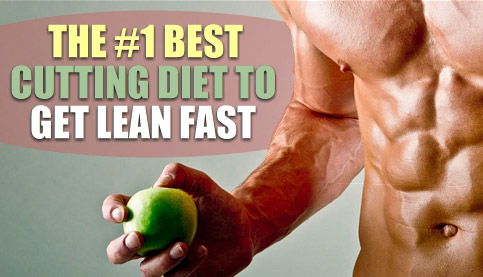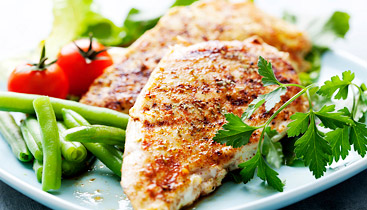THE #1 BEST CUTTING DIET TO LOSE FAT AND GET LEAN

You want to lose fat. You want to get lean. You’ve heard the saying that “abs are made in the kitchen”, but the only problem is, you have no idea where to start.
Every fitness expert out there is feeding you (no pun intended) conflicting advice on what the absolute “best cutting diet” is to reach your goals effectively, and at the end of the day you’re just left even more confused than when you started.
What IS the best dieting approach to get lean fast and melt off that excess flab for good?
Should you eat higher protein and lower carb? Moderate protein and higher carb? High protein, high fat and zero carb?
Should you follow an intermittent fasting diet? Paleo diet? Ketogenic diet? Vegetarian diet?
Should you eat 7 small meals a day, 4 moderate sized meals, or 2 large meals?
Which are the best “fat burning foods” to eat, and which ones should you avoid?
The questions go on and on and can quickly become overwhelming, but today, I’m going to give you the definitive answer once and for all so that you can finally stop over-analyzing and start losing that fat right away…
The Best Cutting Diet To Reach Your Fat Loss Goals

This is going to be a slightly different take on the subject than what you might be used to.
See, when most people go about trying to structure the “best cutting diet” for themselves, they tend to think only in terms of bottom line effectiveness.
In other words, they simply look for the one particular diet that will burn fat as fast as possible.
But in doing so, the critical factor of adherence tends to get overlooked.
A particular cutting diet might be effective when it comes to stripping off fat, but are you actually going to be to able to stick to it long enough in order to reach your goals?
We already know from the statistics (and from every day observation), that the majority of people who begin a fat loss diet will NOT adhere to it over the long term.
Among many reasons for this is the simple fact that the diet itself just isn’t sustainable.
It might involve too large a calorie deficit… it might be overly restrictive… it might be based around a bunch of different “rules” that just aren’t practical for your lifestyle… or it simply might revolve around certain guidelines that you really don’t enjoy following.

For example, some people experience great fat loss success following an intermittent fasting style approach by pushing all of their daily calories into a smaller feeding window. Other people prefer eating smaller meals spread all throughout the day. Some (like myself) prefer to go somewhere in the middle.
That’s all a matter of personal preference, and since meal frequency is essentially a non-issue when it comes to fat loss, all of them work just fine.
If you try to force yourself into a particular diet that deep down you really dislike, it’s highly unlikely that you’ll be able to maintain it over the long haul. You might stick with it for a few weeks or even a few months, but eventually you’re probably going to burn out and quit.
So, what is the best cutting diet for losing fat and keeping it off?

My answer to most people would be this…
It’s whatever diet (assuming you have the basic fundamentals down, which I’ll touch on shortly) that allows you to maintain a calorie deficit long enough to reach your goals. Period.
Regardless of what anyone tries to tell you, fat loss ultimately comes down to one central principle: you must consistently expend more energy than you take in.
In other words, you’ve got to burn more calories than you consume (AKA a “calorie deficit”), and then maintain that state long enough to lose whatever amount of fat you’re aiming for.
And the plain fact of the matter is that this is not an “easy” thing to do, despite what those selling their miracle programs and supplements try to tell you.
It does require hard work, discipline and patience, otherwise everyone would be walking around with a lean and in-shape body.
When you put your body into a calorie deficit, you’re essentially giving your body less food than it wants. And as a result, you will experience a certain level of hunger at certain periods in the day… you will experience some degree of food cravings.. and your energy levels will, overall, be lower than they were when you were eating at maintenance or in a surplus.
That’s just the nature of the process and is to be expected.
The simple reason why most people end up failing in the long run is because they try to maintain that calorie deficit and fight through all of those natural “hunger responses” without stacking the odds heavily enough in their favor right from the get go.
In other words, they don’t lay out their cutting diet in a way that is sustainable for them.
Bottom line effectiveness is one thing, but if you can’t maintain your program long enough to reach your goals, then obviously it’s still going to end up a failure.
Fat loss diet “A” might produce 2 pounds of fat loss a week, but if your goal is to lose 20 pounds and you can only stick to the diet for a month, then clearly that’s not going to do you any good.
On the other hand, if diet “B” only produces 1 pound of fat loss a week, but you can easily maintain it for all 20 weeks, then clearly it’s going to be the superior approach for you.
What are the “fundamentals” I mentioned earlier that you need to take care of first?

Just a few basic things…
1) Make sure you’re getting enough protein to maximize muscle recovery and lean mass retention. You’ll hear plenty of different guidelines here, but anywhere from 0.8-1g per pound of body weight daily is a safe bet for most people.
2) Don’t allow your fat intake to drop too low. Doing so will suppress testosterone production and increase your appetite, among other things. I’d suggest that you get at least 20% of your total daily calories from fat to prevent this.
3) Ensure that your fiber and micronutrient needs are being met in order to optimize fat loss and overall health. You can do this by getting in a couple servings of vegetables and fruits per day, and by making sure that the bulk of your diet is being derived from minimally processed whole foods. A high quality multivitamin can also be used for some extra “nutritional insurance”.
Once you have these basics in place, once again, stack the odds in your favor.
There are all kinds of different factors involved that you can tailor to your own individual preferences and lifestyle…
* If you prefer bigger meals less frequently or smaller meals more frequently, choose the approach that works best for you.
* If you like allocating a higher percentage of your calories toward the earlier hours of the day versus the later hours, or vice versa, go for it.
* If there are certain foods you prefer over others, lay out your diet so that it consists primarily of those items. No single food is mandatory, so just choose those in each category (protein, carbs and fats) that you like best, whether it be white rice vs. brown rice, chicken vs. red meat, yogurt vs. cottage cheese or oatmeal vs. bread.
* If a certain food is a particular “weakness” for you and something that you crave, allocate a certain percentage of your daily calories towards it so that you don’t feel deprived. No, a bit of chocolate, ice cream or cake is not going to hamper your results as long as you track it as part of your intake.
* If you prefer a larger calorie deficit carried out over a shorter time frame or a smaller calorie deficit carried out over a longer time frame, go with the approach that is more appealing for you.
These are just a few of the many factors you can take into account when laying out your own personal cutting diet that maximizes your changes for long term success.
Just remember: whatever system of eating keeps you in a calorie deficit on an ongoing basis long enough to reach your goals is going to be a successful diet.
If you take the time and effort to do that rather than just jumping head-first into some random fat loss diet based around a bunch of rules that may or may not fit your lifestyle or preferences, your chances for long term fat burning success are going to be exponentially higher.
If you found this article helpful, make sure to sign up for your FREE custom fitness plan below...




